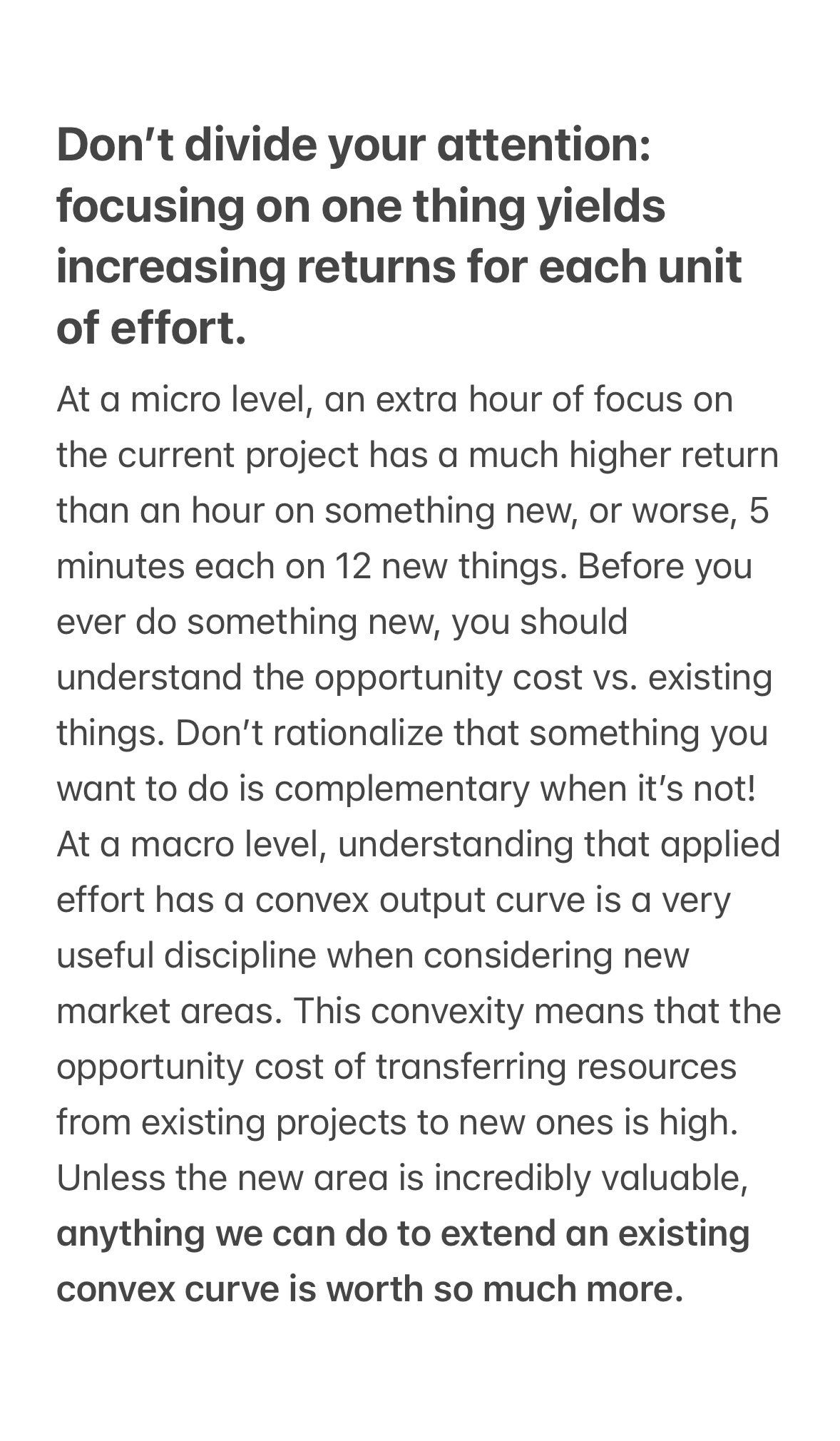Note: With earnings season just around the corner I’ll be continuing my adventure into thought leadership this week.
As we get older, and perhaps wiser, we are confronted with an uneasy reality. The more that time passes, the fewer options we have in front of us. In late adolescence and early adulthood, we are presented with a nearly limitless array of opportunities. Our capacity for new relationships, for adventures, for new hobbies, and on, seems inexhaustible. In this vein, mistakes aren’t as costly as they may be further down the line - that unfortunate career turn is easier to bounce back from and bad relationships can be discarded with ease.
Limitless optionality, however, is a curse masquerading as freedom. While most of us fondly look back on early adulthood through the lenses of rose-tinted glasses, it is often a time of deep existential and emotional turmoil. Directionless people find meaning at the extremes. This breeds cynicism, a condition that engenders selfishness. This serves neither the individual nor the wider society. True freedom is in making a decision, and sticking by it.
Incredible success, in nearly every domain, is the result of a singular focus. Munger was right:
I think people that multitask pay a huge price. They think they’re being extra productive, and I think they’re (out of their mind). I use the metaphor of the one-legged man in the ass-kicking contest.
I think when you multi-task so much, you don’t have time to think about anything deeply. You’re giving the world an advantage you shouldn’t do. Practically everybody is drifting into that mistake.
Concentrating hard on something that is important is … I can’t succeed at all without doing it. I did not succeed in life by intelligence. I succeeded because I have a long attention span.
The examples in history are manifold. Michael Jordan was notoriously single-minded:
Winning has a price, and leadership has a price. So I pulled people along when they didn’t want to be pulled. Once you join the team, you live at a certain standard that I played the game.
The legendary sushi-master Jiro Ono equally adopted the philosophy of the Shokunin (a term that loosely translates into English as ‘craftsman’):
We don’t care about money.
All I want to do is make better sushi. I do the same thing over and over, improving bit by bit. There is always a yearning to achieve more. I’ll continue to climb, trying to reach the top, but no one knows where the top is.
Even at my age (88 years old at the time), after decades of work I don’t think I have achieved perfection. But I feel ecstatic all day, I love making sushi. That’s the spirit of the Shokunin.
The explanation for why such maniacal focus yields results goes further than Mungers explanation. Peter Thiel describes the dynamic that explains the returns that accrue to focus:
Repeat the following: ‘At a macro level, understanding that applied effort has a convex output curve is a very useful discipline when considering new market areas.’
This dictum, of course, applies perfectly to investing.
From the top down this begins with strategy selection and, subsequently, the circle of competence. This week’s Spirit Airlines merger arbitrage debacle has been a timely reminder of the risks posed by a lack of genuine focus in the pursuit of an investment strategy. While this particular situation may have been positive expectancy (I really don’t know), it is emblematic of a greater problem experienced in the investing community.
Many (particularly new) investors jump between different types of opportunities in the mistaken belief that they are adapting to market conditions. The constant refrain is Buffett. I have mentioned on several occasions how Buffett’s success across different investing disciplines has probably been a net negative for those who are looking to emulate him. The Oracle is a singular exemplar in history as someone who has been successful across deep value, liquidation plays, merger arbitrage, bonds, shareholder activism, and quality investing. To my knowledge there is no other historical analogue who comes close in terms of investment prowess in this regard. There are many, many investors who have become rich employing just one of the aforementioned investment styles - and therein lies the point.
As I have developed (somewhat slowly), it has been a liberating experience to leave the limitless optionality of the wider financial markets behind. I don’t need to know anything about commodities, options, futures, cryptocurrency, foreign exchange, special situations, spin-offs, or any of the other countless opportunities that have availed themselves on a near daily basis. I just need to pick really good companies at reasonable prices.
I don’t need to know anything about healthcare, biotech, speciality finance, banking, minerals, or consumer products either. I’m happy if others can make a buck there, but I probably can’t. That money doesn’t have my name on it. Just like another person’s skills, relationship, car, vacation, or job doesn’t have my name on it. All that matter’s is that I collect all the things that do have my name on it.
The perceived risk with intense focus is that you might become blind to other compelling opportunities or you might miss large pitfalls before you’re in them (personal and professional). There’s no path without risk. Conversely, the danger of not focussing intensely is that you may end up doing many things foolishly and none well.
A short focus isn’t conducive to long profits.
Warren Buffett
The convexed nature of applied focus also explains why many of the great investors have concentrated portfolios. You can only really know enough about a relatively few situations to invest in them. Every additional name you add either to the portfolio or to the watchlist is more or less the giving up of additional leverage and understanding you might gain in a current situation.
This idea of deep focus also expands to the macro level of a particular life. It is striking how empty the personal life (at least for a time) was of many of the luminaries described above. Michael Jordan really didn’t do a whole lot other than play basketball for the first few years of his career. Buffett worked alone in a small study off his bedroom for the first 6 or 7 years of the Buffett Partnership. He has lived in the same home since the 1950s. It is relatively well known that he was something of an absentee father. Jiro Ono has had the same daily routine for 70 years - apprentices at his sushi restaurant practice making rice for 10 years before they are invited to progress to more advanced dishes. This isn’t to say that these people should be imitated, but success leaves clues.
Larry.






A simple idea taken seriously was what led me to owning enphase in 2018.
Great piece. This is going to tie in nicely to a future piece I'm working on.